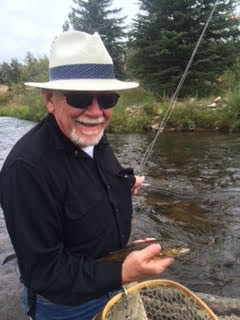Over a forty plus years career I spent plenty of time in what professionals describe as “continuing education”. Lucky for me most continuing education classes only require money as the prerequisite for registration. Consequently, armed solely with a high school equivalency or GED, I achieved several professional designations and enjoyed a long career as a Property Tax Consultant. How this came about is a separate story.
This story is about my awakening desire to gain the formal education I failed to pursue as a youth.
My wife Cheryl, who in addition to being my office manager, business manager, and partner, was also a Red Cross volunteer. Upon returning from deployment in New Orleans after Hurricane Katrina she concluded that being able to speak Spanish with those she helped would be a big plus. At seventy years of age, I was still working but wanted to find pursuits of interest for when my golden years actually arrived. Learning a foreign language seemed a good place to begin. Therefore, we set off together. Her with a true eleemosynary mission and me with the lofty goal of reading menus at Mexican restaurants then boldly ordering in Spanish.
After five semesters of taking classes at both Wichita State, and Friends University, I can now discern the ingredients in a chimichanga. Still today, with the generous help of Google, I can read Spanish language children’s books – provided the target audience is no older than four.
Learning to conjugate a few verbs in a foreign language awoke in me a Rodney Dangerfield “Back to School” idea. I mused, could I actually attend college? Could I actually earn a degree? If I did, what would be my area of study? What did I really want to learn? I considered history. Oh, how I love history. I’ve read everything Joyce Kerns Goodwin, John Meacham, and David McCullough have written. English? Perhaps I could learn proper sentence structure and expand my vocabulary. Literature? I love all kinds of books. I began telling Cheryl I might want to get serious about college and sought her advice. She was very encouraging but had no desire to join me. After graduating from Oklahoma State in accounting as a traditional age student then returning to school ten years later to earn an art degree from Friends University – a Quaker school in Wichita affectionately known as Old FU – she was done with academics.
My youngest daughter, a Fulbright Scholar, suggested philosophy. My stepson applauded the idea recalling I had helped him in his high school studies of Descartes and Plato.
A search of various classes available at WSU (Wichita State University)- it was far more affordable than Old FU – I chose Philosophy 101 as a place to begin. I became really excited to learn what those philosophers I had read actually meant. Who were the ones I’d never heard of? What did they say, and what did they mean?
I discovered a night course for intro to philosophy “a study of existence, knowledge, values, reason, mind and language. The classroom was on the west side campus only a few minutes from our home. Class met one night each week for three hours. Perfect! A little nervous and at the same time as giddy as a little leaguer eating ice cream, I arrived early for the first class and took a seat on the front row. I had all the required books and texts. I had completed all the pre-class reading assignments. If this was going to be graded on a curve, I planned to be the traditional aged students’ worst nightmare.
That’s when I leaned the truth about night classes. Every other student in class was an undergrad looking to fulfill a credit requirement that had been put off until last, or at least late, in their studies. Some had children that would do homework in the lobby while waiting on mom or dad to take them home for a late dinner. It turned out I was the only one in the room that was actually excited to be there.
Everyone, save me, pined to be somewhere else. And that included the teacher. A young woman from San Francisco. Who, having just earned her PHD was starting her first post-grad job. Naturally, administration gave her the assignment no other professor on staff wanted. That of teaching philosophy to engineering students at night in a required class they did not want. It was a required credit to finish a career-oriented dream degree in aeronautical engineering. It’s safe to say my enthusiasm was not infectious.
To compound matters, this was before I started wearing hearing aids and the teacher had a very thick Chinese accent. I chose a seat on the front row, partly to mediate my hearing loss, see the board better, and secretly, hoping I would get called on more often.
So, you get the idea. Regardless of my senior status I had little experience in a classroom setting. Early in the first class, the instructor went from student to student asking us to name our favorite contemporary philosopher. I’d recently seen Chris Rock’s HBO special in which he makes, what I thought, a very clear-eyed commentary on race relations and society. I recall thinking, he’s not just funny he’s really smart, and an important voice all should hear. So, when it became my turn, I proudly named Chris Rock as my favorite. A few students snickered when it became obvious the teacher had never heard of Chris Rock. Someone eventually clued her in that “he is a black stand-up comedian”. In the awkward moment of silence that followed, her eyes fixed on me like laser beams. I imagined a thought bubble above her head saying, “this old man is going to make a bad experience intolerable”.
Our relationship went down hill from there. That is until about mid-term. One week our assignment was to read certain pages in Marx and Engels’ “Communist Manifesto”. During the teacher’s opening comments a young man, who always set in the back near the door, complained loudly, “WE HAVE NUTHIN TA LEARN FROM THOSE RUSSIAN COMMIE BASTARDS”. I was pretty sure – at least I wanted to believe – I heard several classmates, and the teacher, chuckle when I stood up, turned around, and addressed him directly pointing out, both Marx and Engels were German and spent much of there life in England.
Perhaps I did not become her favorite, but at least I no longer left class with laser burns on my chest.
I don’t regret taking the class. It remains a treasured experience. But any idea of getting serious about immersing myself into the pursuit of a degree was fully dismissed.



























